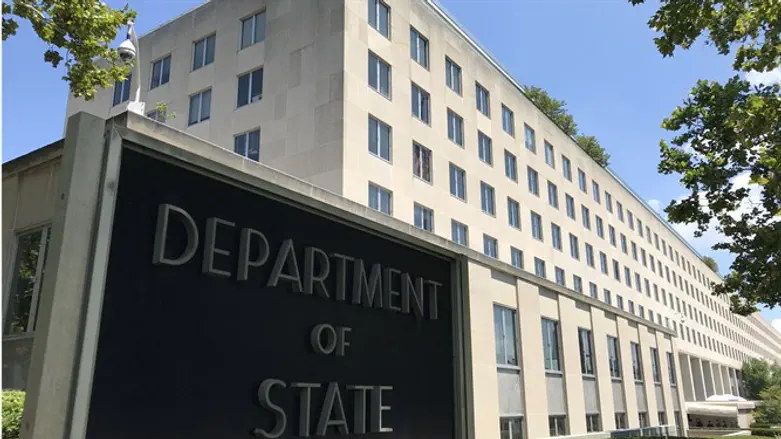
William Burns is one of the leading veterans of the State Department, representing its deeply-rooted worldview :
*Multilateralism and coalition-building over unilateral policy;
*Military restraint and supremacy of diplomacy/coercive-diplomacy; *International law, human rights and democracy-driven policy;
*Rejection of regime-change initiatives;
*Palestinian prominence in Middle East policy;
*Viewing Islamic terrorism as despair-driven;
*Misperceiving the raging Arab Tsunami as if it were Arab Spring.
William Burns served as Deputy Secretary of State and Assistant Secretary of State for Near East Affairs during the Obama Administration. He was part of the State Department establishment, which considered Saddam Hussein a potential ally until his August 1990 invasion of Kuwait; played a key role in the 2009 embrace of Egypt's Muslim Brotherhood, while abandoning President Mubarak; was a major proponent of the 2011 US-led military offensive which transformed Libya into a global platform of Islamic terrorism; and was one of the early architects of the 2015 Iran nuclear accord (JCPOA), conducting secret talks in Oman.
Since 2015, William Burns has been the President of the prestigious Carnegie Endowment for International Peace, which has espoused the aforementioned worldview of the State Department.
Carnegie's "Middle East analysis" section is replete with documents, which are pro-Palestinian and critical of Israel and the last four years' US policy in the Middle East, including the recognition of Jerusalem as Israel's capital and the relocation of the US Embassy to Jerusalem. Also, Carnegie Endowment documents feature criticism of "Israel's shrinking democracy," Israel's treatment of "Palestinian activists" and "Palestinian popular resistance," "Israel's responsibility for the Palestinian financial crisis," and "Gun violence in Israel's Palestinian community."
While criticizing pro-US Egypt and Saudi Arabia because of their human rights record, Carnegie's documents define the Muslim Brotherhood – which has terrorized the Middle East since 1952, including Egypt, Saudi Arabia, the United Arab Emirates, Jordan and Bahrain – as a legitimate political organization.
Iran
The designation of William Burns as the next Director of the CIA highlights President-elect Biden's determination to join a renegotiated nuclear agreement (JCPOA) with Iran's Ayatollahs, which will be wider in scope and longer in duration.
According to Burns, "We need to find a way back to an updated nuclear deal with Iran. That will not be a miracle cure for all our serious differences with the current regime in Tehran, from its regional aggression to its domestic repression. It will, however, be an essential starting point for countering its threats and 
The JCPOA represents a school of thought, which assumes that Iran's Ayatollahs are credible negotiators, and are amenable to peaceful-coexistence and power-sharing with their Gulf neighbors. eventually reducing them…."
eventually reducing them…."
The JCPOA represents a school of thought, which assumes that Iran's Ayatollahs are credible negotiators, and are amenable to peaceful-coexistence and power-sharing with their Gulf neighbors. Burns assumes that Saudi-Iranian peaceful coexistence is possible due to their mutual interest in stable competition.
"A lot will depend on the prospects for Saudis and Iranians finding some basis for regional co-existence—built not on trust or the end of rivalry, but on the more cold-blooded assumption that they both have a stake in stable competition."
Burns contends that lifting sanctions – through the JCPOA – "exposed the regime's vulnerabilities," since the Ayatollahs could no longer blame the US for their economic woes, stemming from corruption and mismanagement. He compared Trump's withdrawal from the JCPOA to the US unilateralism that led to the 2003 invasion of Iraq. "Nixing the nuclear accord was a dangerous dismissiveness of diplomacy." According to Burns, the abandonment of the nuclear accord was all coercion and no diplomacy.
A major dilemma facing the proponents of a renegotiated JCPOA: Is the Iranian leopard capable of changing spots, not just tactics?
Saudi Arabia
As opined by Burns, "we ought to support them [Saudi Arabia and the Arab Gulf States] against legitimate external security threats, from Iran or anyone else, and back serious political and economic modernization. [However], they need to stop acting as if they’re entitled to a blank check from us, end the catastrophic war in Yemen, stop meddling in political transitions in places such as Libya and Sudan, and manage their internal rivalries."
Just like Egypt, Saudi Arabia expects to be targeted for US criticism on account of its human rights and democracy record, including the attitude toward the Muslim Brotherhood, which is determined to topple all pro-US Arab regimes, and is the largest Islamic terror organization with a litany of political affiliates throughout the globe, including the US (e.g., CAIR, ISNA, AMC).
In addition, Egypt, Saudi Arabia and the United Arab Emirates are reprimanded, by the incoming US Administration, for their military involvement in Libya, Sudan and Yemen, which involves fighting against Iran's Ayatollahs (in Yemen) and Sunni Islamic terrorists (in Libya and Sudan).
Israel
In his memoir, William Burns detailed his efforts to explicitly criticize Israel, when he was the Assistant Secretary of State for Near East Affairs during the George W. Bush administration. Burns was a proponent for providing a clear vision for a viable Palestinian state. In June 2002, he told an Israel official that "the one thing Palestinians are more fed up with than Arafat is the Israeli occupation."
"Our commitment to Israel’s security is deep-rooted, and its emergence as a military and economic powerhouse in the region is a remarkable story. And yet it is hard to see how Israel’s long-term security interests, let alone its future as a Jewish democracy, are served by the emergence of a one-state solution, with Arabs in the majority in the land Israel controls from the Jordan River to the Mediterranean."
Like the State Department's establishment, William Burns is unaware of the demographic reality west of the Jordan River, which features a dramatic Westernization of Arab demography and unprecedented Jewish demographic tailwind.
Ambassador (ret.) Yoram Ettinger, "Second Thought: US-Israel Initiative,, https://bit.ly/3nFoei2